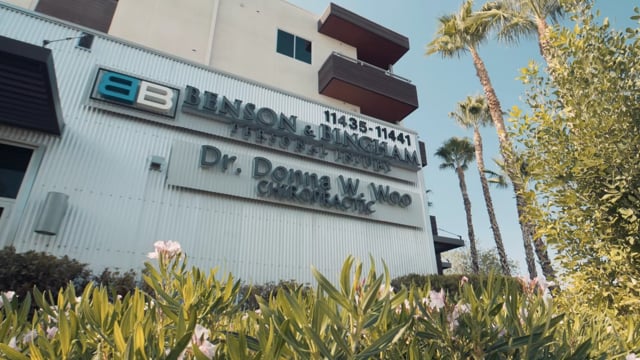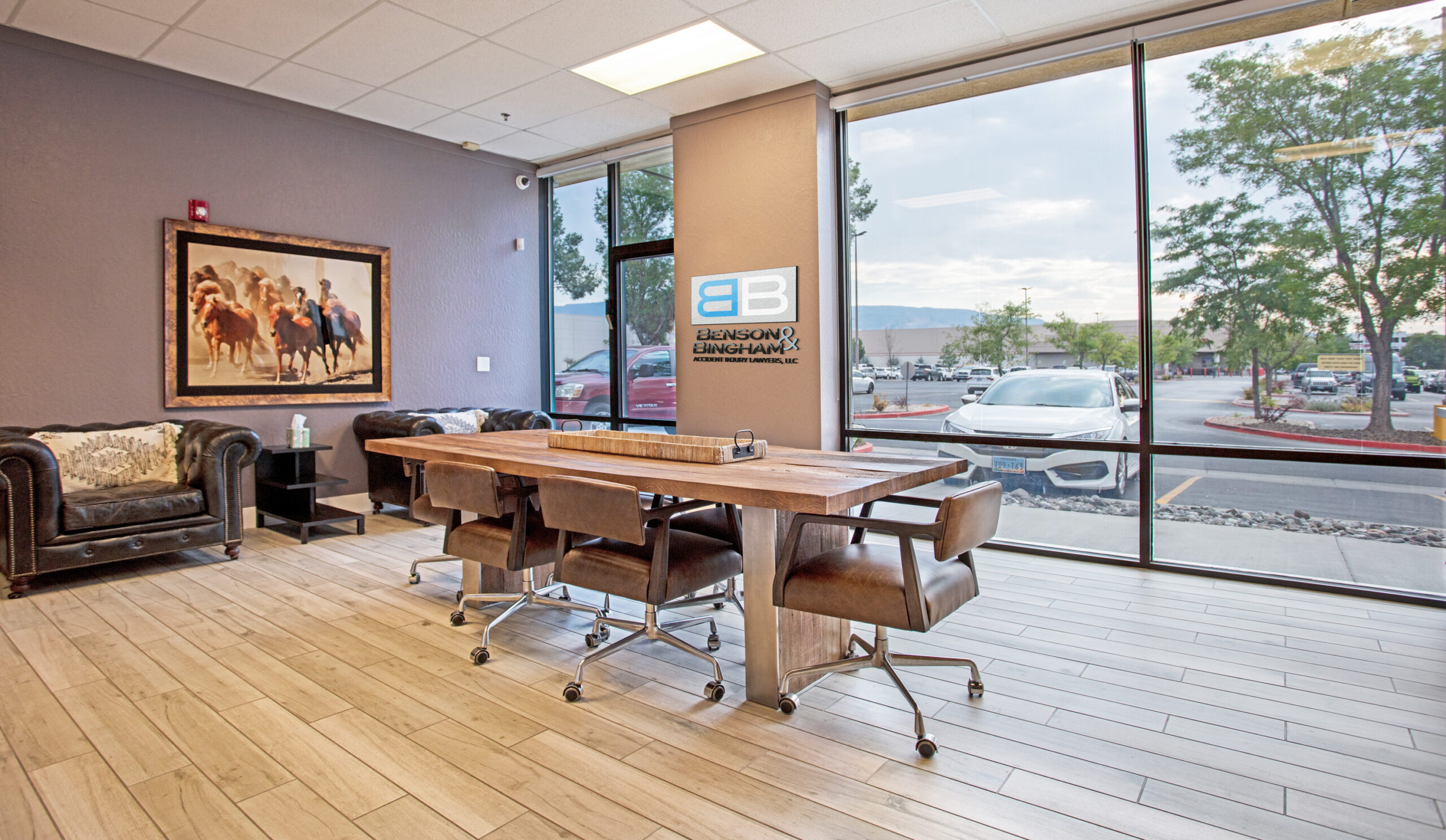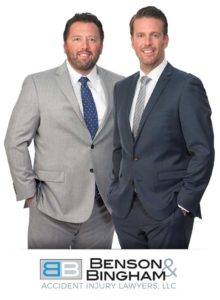Reno Premises Liability Lawyer

Accidents in Reno can put a substantial damper on your vacation plans. One minute, you planned to enjoy a few hours in the casino, the next, serious injuries have derailed not only your vacation, but potentially the rest of your life. Whether negligent casino security resulted in serious injuries due to another patron’s actions or you found yourself with severe injuries after a slip and fall in a casino, hotel, or restaurant, you may need a Reno premises liability lawyer.
Contact the Reno personal injury lawyers at Benson & Bingham Accident Injury Lawyers, LLC to discuss the merits of your case to determine if you are entitled compensation for your injuries. We have obtained more than $500 million in settlements and judgments for our clients, including:
- $1,200,000 million in a slip and fall case
- $500,000 when a client lost a leg after a slip and fall
- $500,000 for injuries suffered in an elevator accident
- $325,000 for a slip and fall involving a storm drain
- $350,000 in an elevator accident
- $300,000 after a fog attacked a senior citizen
- $200,000 when a client slipped and fell on a marble floor
- $195,000 for negligence on the part of a casino employee

Reno Premises Liability Accidents
Your Reno/Lake Tahoe trip should have allowed you plenty of fun and excitement. Unfortunately, you may have discovered unexpected dangers on your trip. Consider these common accidents:
Slip and Fall Accidents
Whether you visit a casino, a hotel, or one of the many entertainment venues throughout the Reno and Lake Tahoe areas, you expect a safe experience: handrails next to staircases, floors free of potential hazards, and warnings before you walk across a surface that could increase your risk of injury.
Slip and fall accidents can cause serious injuries that result in lifelong limitations, including:
- Traumatic brain injury
- Spinal cord injury
- Broken bones, including hips, especially in elderly individuals
Inadequate or Incompetent Security
In casinos, emotions can quickly run high. Vacation-goers may also struggle with heightened emotion as they visit their hotels. Those facilities must, therefore, exercise care to provide adequate security to help protect their visitors.
If you suffer serious injuries due to an attack from another patron or because security failed to protect you, you may suffer:
- Broken bones
- Internal organ damage
- Soft tissue damage
- Gunshot wounds
- Stab wounds
Pool Accidents
Swimming pools can pose a particular danger to children. Many Reno hotels offer swimming pools to help entertain children while they visit, but those pools can pose a drowning hazard, especially when not properly maintained. Hotels must exercise care to prevent accidents, including properly securing the pool so that children cannot get in without an adult escort.
Did You Suffer an Accident in a Reno Facility?
Whether in a casino, a hotel, or another Reno/Lake Tahoe business, inadequate security or poor precautions to maintain the safety of visitors to the facility can cause serious accidents. If you suffer a premises liability accident, an attorney can help you seek the compensation you deserve. An attorney can help collect evidence: video footage of the accident, witness statements, and pictures of the scene of the accident that can help prove how your accident occurred.
Reno Premises Liability Accidents: How Much Compensation Should You Expect?
The first question for which many people want answers when they start a personal injury claim sounds something like: “How much compensation should I expect for my injuries?” The answer? It depends. An attorney cannot guarantee how much compensation you will receive following any accident.
How much you receive will depend on:
Who caused your accident? Most critically, who bears legal liability for your accident? In a premises liability accident, this typically includes the premises owner and the company that operates out of the premises, depending on how the accident occurred and who bears responsibility for its upkeep. For example, if you suffered injuries due to inadequate security, the company operating in that location likely bears liability for your injuries. If you suffered injuries in a slip and fall, either the owner of the premises or the company operating there may bear liability for the accident.
You may receive more compensation for your injuries if you can claim compensation against more than one party. You may also find that the party that caused your accident carries premises liability insurance, and the limits of that policy may determine how much compensation you receive.
How high did your medical bills mount? After an accident in a Reno facility, your medical bills may mount quickly. Not only will you need to pay for emergency treatment for your injuries, if you have long-term complications from your injuries, including traumatic brain injury or spinal cord damage, you may expect those expenses to continue to mount long-term.
You can include your medical expenses as part of your premises liability claim, including:
- Emergency treatment
- Hospitalization
- Transport, if you need to move to a facility closer to home
- Surgery or other treatments
- Physical therapy
- Occupational therapy
- Modifications to your residence to accommodate your injuries
How much work did you miss due to your injuries? Even minor injuries can leave you out of work for weeks during your recovery. More serious injuries can leave you unable to work for months or longer, especially if you require multiple treatments or your injuries entirely prevent you from returning to your usual work tasks. Some serious injuries can even prevent you from ever returning to your former profession.
In addition to the other factors that influence your premises liability claim, an experienced attorney will help you determine how pain and suffering can influence your claim. An attorney will evaluate physical pain and suffering along with any emotional distress suffered as a result of the accident, including the loss of relationships or the need to miss out on previously-planned activities—including, for example, having to cut a Reno vacation short due to your injuries.
Premises Liability Insurance
Many facilities carry premises liability insurance to help cover any injuries sustained in that facility. This insurance company may contact you with a settlement offer shortly after your accident. Consult an experienced premises liability attorney before accepting, since the offer may not provide adequate compensation for your expenses and losses following a serious accident. An attorney can give you a better idea of how much compensation you deserve for your injuries and assist you as you negotiate with the insurance company.
Reno Premises Liability Frequently Asked Questions FAQs
In Reno and Lake Tahoe, all owners of residential and commercial property—as well as the managing agencies of public property—are required to ensure that their property is safe from hazards that could harm their guests. This is known as premises liability. There are several different types of premises liability, however, and it is often a misunderstood part of the law. Read on for answers to the questions we are most often asked about premises liability.
What types of accidents involve premises liability?

Some of the types of accidents that can lead to premises liability include:
- Slip and fall accidents: This is the most common type of premises liability claim and involves injuries that were incurred when the injured person slipped or tripped over a dangerous property feature such as wet or freshly waxed floors, damaged flooring materials, improperly constructed or maintained staircases, poor lighting, cracks in the walkway, potholes in the parking lot, and obstacles or debris in areas where people walk.
- Swimming pool accidents: Accidents and injuries can be caused in swimming pools, including drownings, diving accidents, and injuries caused by the pool’s drain or filtering system. While there is an obvious danger with pools that cannot be completely mitigated through actions such as fencing, providing lifeguards, and other precautions, public, commercial, and residential swimming pool owners are obligated to mitigate the risks that they know about.
- Negligent security: Not all hazards have to do with a specific property feature. Property owners also have an obligation to do what they can to protect their visitors from violent crimes. This is of particular importance in hotels and apartment complexes, where residents should be provided with properly working locks on doors and windows, as well as surveillance in common areas, security guards, and security patrols in parking lots in high crime areas.
- Escalators/ elevators: Escalators and elevators pose an unavoidable—and obvious—risk simply due to moving parts and elevations. While these risks are unavoidable, property owners must ensure that the apparatus is properly maintained and mitigate as many dangers posed by their use as possible.
- Dog bites: Although the state’s law does not explicitly state when a dog owner is responsible for his or her dog biting someone on the property, common law leans toward the “one bite rule.” What this means is that, if the dog has previously bitten someone, then the owner should be aware that the dog is vicious and take reasonable care to keep guests safe by penning the dog and posting prominent signs warning of a vicious dog on the premises. Defenses against liability include the dog biting while trying to protect its owner or property, dog bites that result from someone teasing or tormenting the dog, dog bites caused by a police or military working dog, or bites that result from a mother dog attempting to protect her puppies.
What are common defenses to premises liability claims?
Three main defenses that are often used to avoid liability in this type of claim include:
- Open and obvious danger. Many property owners argue that the hazard that caused the accident was so obvious that the injured person should have taken precautions to avoid injury.
- The injured person was responsible for their own accident. Insurance providers for property owners will often argue that the accident was caused because the injured person was looking down at their phone, or wearing the wrong type of shoes for the environment at the location.
- You were on a part of the property where guests normally aren’t allowed or expected to be.
What damages can I recover through a premises liability lawsuit?
Some of the damage you can recover through a premises liability lawsuit includes medical expenses, lost wages, loss of future earning capacity, damage to personal property as a result of the accident (if you fall and break your phone or an expensive watch, for example), physical pain and suffering, and emotional distress.
What is the attractive nuisance doctrine?
While most trespassers are only afforded minimal duty of care from property owners—such as not deliberately setting a trap to lure and harm a trespasser—special care is afforded to child trespassers whose natural curiosity may entice them to wander onto a property. Under the attractive nuisance doctrine, property owners are required to safeguard certain features such as swimming pools, old cars, and appliances on the property to protect curious children from becoming injured.
If a person becomes injured in a hotel pool, is the hotel liable?
It depends on the circumstances surrounding the injury. Pools of water are, by their very nature, dangerous. Hotel owners attempt to reduce much of the liability they face from the potential of guests becoming injured by the pool by posting signs in prominent areas stating that guests use the pool at their own risk, that they must provide children with adult supervision, and that no lifeguard is on duty.
What is my landlord required to do to make my apartment safe?
Your landlord must keep your apartment maintained in a condition that is not hazardous to your health and does not place you at risk of injury. This includes following building codes during construction, replacing loose floorboards or worn flooring materials, providing your residence with locks on doors and windows, providing parking lot security in areas known to have a high crime rate, and other actions designed to protect your wellbeing.
How long do I have to file a premises liability claim in Nevada?
The statute of limitations on premises liability claims in Nevada is two years from the date that the accident occurred.
Do I need an attorney for this type of claim?
While nobody is required to hire an attorney, doing so is likely the best decision you can make to increase the odds of a favorable outcome. If you have suffered an injury due to the negligence of a property owner, a premises liability attorney can greatly enhance your ability to recover damages. Attorneys spend many years obtaining education and experience to handle cases like these and to provide knowledgeable guidance to their clients; more importantly, it’s a virtual guarantee that the party responsible for your injuries and their insurer will hire legal representation. If you sustained injuries due to the negligence of a property owner or manager, consider speaking with the experienced Reno premises liability lawyers at Benson & Bingham Accident Injury Lawyers, LLC, as soon as possible.
Contact a Reno Premises Liability Attorney Today
If you sustained serious injuries in a Reno premises liability accident, do not wait.
Contact Benson & Bingham Accident Injury Lawyers, LLC, today at (775) 600-6000 for a free consultation. We know how to help those who sustained injuries on other people’s property. We also serve clients in Lake Tahoe, Sparks, and Carson City.
Review: 5/5 ★ ★ ★ ★ ★
“Benson & Bingham handled my case so quickly and professionally.” -Holly H.
Free Consultation

